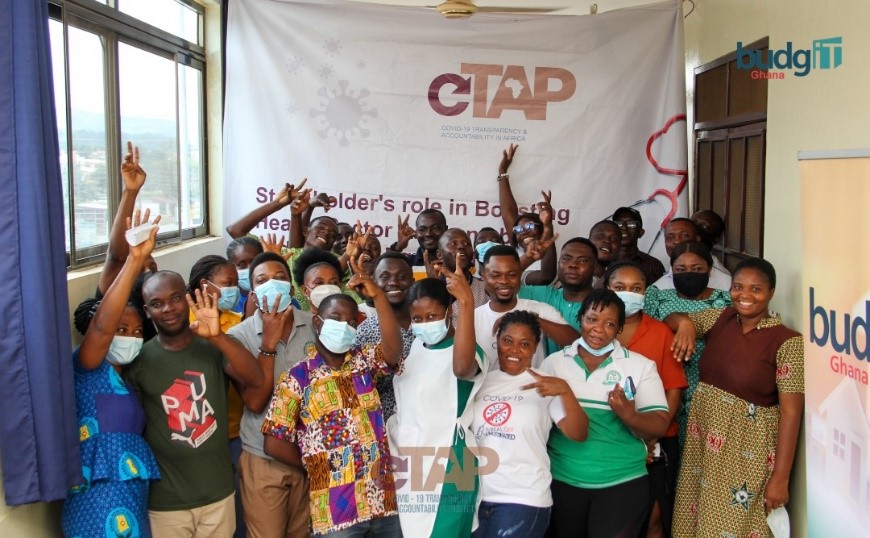In our quest to fulfil the mandate for transparency and financial accountability of the covid-19 funds, BudgIT Ghana has engaged numerous individuals and organisations, including government officials, on their views about the disbursement and distribution of the Covid-19 funds and vaccine.
We achieved this mandate through Institutional Engagements, Infographics and Social Media Engagements, Blogposts, Press Releases, Radio Shows, Podcasts, and Town Hall Meetings. For example, our CTAP Town Hall meetings consist of people from diverse occupations and orientations. The town hall engagements gave a holistic overview of the reality on the ground and measures employed by both government and individuals in tackling the pandemic.
At the outset, our Town Hall engagements enabled us to discover that a large majority of individuals and Micro, Small And Medium Enterprise (MSME) that applied for the Coronavirus Alleviation Programme Business Support (CAP BuSS) Fund implemented by the Ghana Enterprises Agency (GEA), to distribute Ghc 600 million out of the approved Ghc 1.2 billion from the National Covid-19 Trust Fund by Parliament to curb the devastating effect of the pandemic on businesses did not yield the desired outcome for which the fund was instituted.

It is a widespread belief among the populace that the Covid-19 pandemic enriched a large majority of politicians, with the incumbent government and its cronies being the largest beneficiary and not the citizens it was meant to relieve. For instance, Minister of Health Involved in Vaccine Procurement Fraud by willfully causing financial loss to the state. This has led to the gross apathy of the majority of Ghanaians against the incumbent government and a strong disconnect of the citizens to active political participation.
Furthermore, our town hall meetings brought to light discrepancies in the health sector in selecting frontline workers and the awarding of frontline workers’ packages. Our engagements with nurses, doctors, and health workers in the various National Community-based Health Planning Services (CHPS) compounds, district and regional hospitals revealed that the criteria used to select frontline workers (those responsible for contact tracing of individuals who have tested positive for the virus and those they have interacted with within a period) was politically motivated. People selected to act in this capacity were sympathisers or members of the ruling New Patriotic Party (NPP). Thus, those that genuinely qualified to work were exempted. Also, some health workers argued that the definition of frontline health workers was flawed because every health worker in Ghana during the pandemic was a frontline worker. For instance, the first covid-19 case reported by the staff of the Somanya Polyclinic (A town in the Eastern Region) was because an Out-Patient Department (OPD) patient transferred the virus to a clerk upon arrival at the hospital unknowingly. Within weeks majority of the staff had been affected. Thus, they believe they are at equal risk as their counterparts conducting the contact tracing and running of the covid-19 tests in the Laboratories.
What is more, income tax waivers (Covid-19 income tax waivers on arrears and income tax waiver) that exempted health professionals from paying income tax are now being deducted in small quantities from their salaries by the Controller and Accountant General Department. Find Below a copy of the slips.
Moreover, the locked down period brought about a steep increment in the prices of food and essentials across the country. Through our town hall engagement, participants believed that the government failed to regulate the prices of essential goods, which added to ordinary Ghanaian’s woes.
The agitations at all town hall meetings have been exceptional. It is worth noting that the introduction of new taxes like the COVID-19 Levy on all purchases, direct and indirect, as well as the increased tariffs on utility bills (Water and Electricity) and fuel prices increment, has brought most Ghanaians to their knees.
In addition, students in Ghana missed nine months of studies which amounted to 1 academic calendar, which adversely affected most Senior High School (SHS) Students, especially those that had to prepare for the West Africa Examinations Council (WAEC) papers immediately after they resumed school. In a similar Town Hall event, Students from the Somanya SHS lamented how ill-prepared they were to write the exams. Furthermore, such a directive by the government to suspend large public gatherings led to the apparent collapse of most Private Senior High Schools within the country, leading to the redundancy of some teachers and staff of these schools. It was realized that local community engagements like town hall meetings are essential to advocate for health sector accountability and transparency.
In addition, just like our town hall engagements, our radio show programs with partner radio stations brought to the fore the economic and social isolation hardships most people had to deal with due to the pandemic. Listeners who called in on these shows expressed their grave displeasure and apathy at how the government disbursed the Covid -19 Relief Funds.
Besides, health professionals did not educate people effectively on the efficacy of the vaccines, and neither were community health volunteers deployed to inform people within their communities about the vaccine and why it’s necessary to get vaccinated. Thus, the team used such platforms to combat vaccine hesitancy among the listeners and show evidence that everyone on the team had been vaccinated. On the other hand, issues like unlawful procurement, political use of funds and other reliefs, and the diversion of funds into government officials’ bank accounts were other grievances raised by listeners. Also, the team used the medium to gather opinion polls to measure vaccine hesitancy rate and the number of people who received the Covid-19 Relief Funds.
On the other hand, the team used Podcasts on the adverse effect of the pandemic on mental health space to address critical issues like “how people fared during the heat of the pandemic and post-pandemic”. This was necessary because, before the COVID-19 pandemic, mental health challenges were not openly discussed and not paid attention to. However, COVID-19 brought to the forefront such discussions on radio, television, and social media due to the steep rise in suicide, depression, and other domestic abuses. The team leveraged their network and engaged a psychoanalyst Dr Edem Nukunu (Mednova Clinics), to explain the need to seek professional help when faced with mental health issues and explained to our listeners the provisions in the Mental Health Act 846 (Act 2012). Now mental health issues are taken seriously, recognized, and openly discussed on various forums and gatherings. Finally, 1 % of the budget allocated to health is given to the Mental Health Council for mental health outreaches.
Furthermore, through Blogpost on Health Sector Accountability I, project team members expressed their sentiments concerning health sector accountability in Ghana based on the available data they gathered throughout their CTAP Engagements. Media houses comprising print graphics, online, radio, and television were engaged numerous times at each step of the CTAP Phase II journey. The team also leveraged Press Releases to the media to publicize CTAP activities within the country.
Then again, the team utilized creative online tools to produce infographics on COVID-19 Fund Management and to engage social media audiences on platforms like Twitter, Facebook, and Instagram. At the Ada-Foah Town Hall Meeting, vaccine hesitancy was discussed in detail, and Districts Assembly Members were present, unable to account for COVID-19 Relieve Funds for their District. The need arose due to the mass hesitancy issues nationwide due to cultural, political, religious, or personal beliefs against the various vaccines available in Ghana. Social media provided comprehensive coverage to campaign against vaccine hesitancy and encourage individuals, families, associations, and groups to Get Vaccinated Now!!! The hashtag used for this campaign is #VaccineSavesLives
Our engagements will not be complete without publishing and launching our two comprehensive research works on Health Sector Transparency and Accountability and Vaccine Equity and Distribution. Data from our numerous town hall meetings and radio shows back these two reports. This research is available in hardcopies which were distributed in Health Centers, to the media, Individuals, and State Institutions like the Ministry of Health (MoH), Ghana Health Service (GHS), Noguchi Memorial Institute for Medical Research – Legon, and other Civil Society Organizations (CSOs).
BudgIT Ghana’s institutional engagement plays a pivotal role in all activities. It enables the organization to interact with industry players to have first-hand information about the research activities and exchange crucial information that will ignite positive change and partnership. Through institutional engagement, the team unravelled Ghc 2.2 million allocated to Noguchi Memorial Institute for Medical Research – Legon from the National COVID-19 Trust Fund (NCTF).
In a similar engagement at the Ministry of Health, the team engaged Dr Barnabas Yeboah – Head of Nursing and Midwifery and Community-based Health Planning and Services (CHPS) Compounds. In his remarks, Dr Yeboah commended the team for their steadfast role in building the health sector in Ghana through their targeted activities. He was encouraged that a civil society organization has taken on the part of pushing for accountability and transparency in the health sector. His vision is to see accountability in all government/state-owned institutions, beginning with the health sector. His office is open to partnership, especially in accessing health sector data for research work and reviewing research output.
Furthermore, as part of strengthening health systems in Ghana, BudgIT Ghana took advantage of the Open Governance Partnership (OGP) Week to collaborate with the Ghana Anti-Corruption Coalition (GACC) to train the members of the Local Accountability Network (LANet) in fact-checking and the power of social and active citizens in building open governance in Ghana.
What is more, The BudgIT Ghana team, represented by Ms Jennifer Addochoe Moffatt, who was a speaker at the event through a round table discussion, shared the team’s Journey on the Covid-19 Transparency and Accountability Project (CTAP) on the topic – Strengthening Health Sector Accountability in Africa: lessons from the COVID-19 Pandemic.
She recounted the team’s journey through their numerous Townhall meetings to radio shows and conducted in-depth research and analysis into the healthcare sector of Ghana. The evidence of Covid-19 procurement fraud, unaccounted Covid-19 Alleviation Programme Business Support Scheme (CAP BuSS) Funds, and disparity in vaccine disbursement throughout the regions during the heat of the covid-19 pandemic in Ghana. These concerns have given rise to the need for an all-inclusive Health Sector Accountability Policy included in the OGP National Action Plan to facilitate a reporting procedure to monitor, track and analyze health sector disbursement and procurements.
In their interaction with the OGP Secretariat of Ghana headed by Hon. Yaw Osafo-Maafo (Senior Minister and Head of OGP Secretariat – Ghana), the team is championing and spearheading the inclusion of Health Sector Accountability in the next National Action Plan of Ghana.
Finally, in line with BudgIT Ghana’s planned activities for the CTAP Project, pending actions includes CTAP Activation Float, where the team and volunteers will have a walk from the BudgIT Ghana office through some selected communities, the Madina Market and end at the Legon-Atomic Junction. The essence of the float is to create awareness of the COVID-19 virus, debunk myths around the vaccine and encourage people to get COVID-19 Vaccines.
Through this activity, we hope to reach 5,000 people. We will leverage celebrities and social media influencers in this campaign to encourage their followers to vaccinate and keep the conversation active online. #VaccineSavesLives advertisement on Billboards at strategic locations and CTAP Phase II Coalition are the last activities for Phase II.
In conclusion, the CTAP journey has been rigorous, educating, fun and, most importantly, filled with many lessons for the team. The various activities and interactions have brought to the fore different perspectives to understand the socioeconomic as well as sociopolitical impact and influences of the pandemic on individuals, families, businesses, religious establishments, educational facilities, healthcare, the political landscape, and the greed and unfeeling mood of our leaders in governance. More must be done in health to ensure rigorous accountability for health-related projects.
